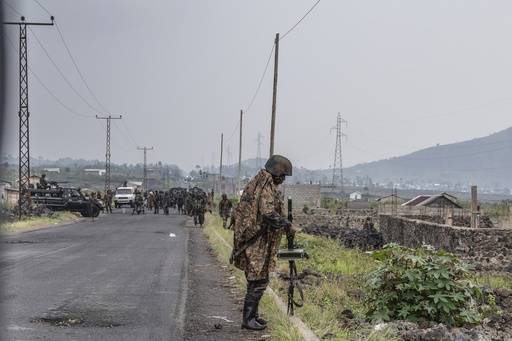In a significant humanitarian operation, the United Nations successfully evacuated a group of critically injured South African peacekeepers from the conflict zones in eastern Congo. The announcement was made by the South African National Defense Force (SANDF), as spokesperson Siphiwe Dlamini confirmed the injured soldiers have now returned home. Although the spokesperson refrained from disclosing the exact number of repatriated troops, it was confirmed that they had been under medical care in Goma, a city under the control of rebel forces in eastern Congo.
Goma, a city with a population of approximately 2 million, was captured by the M23 rebels in January. These insurgents, reportedly supported by Rwandan forces, have been waging a relentless campaign in the mineral-rich eastern regions of Congo, sparking international concern. U.N. efforts to restore operations at Goma’s airport have been a focal point as tensions persist.
The M23, believed to be bolstered by about 4,000 Rwandan troops, now commands both Goma and Bukavu, the largest cities in the east. According to Congolese government reports, the swift advance of these rebels has resulted in approximately 7,000 casualties. Meanwhile, the SANDF has indicated that another contingent of their soldiers is expected to return later in the week.
An official from the national union representing South African armed forces personnel has revealed that the evacuation extends more broadly, involving over 100 sick and injured soldiers. Among these evacuees, three have been identified as requiring urgent medical intervention. Additionally, according to the union’s national secretary, Pikkie Greef, two female soldiers in the group are pregnant.
Although Dlamini did not address these specific claims, Greef stated that the evacuation route included passage through Rwanda. This evacuation comes after a tragic confrontation in January, where 14 South African peacekeepers lost their lives. Initial reports suggested that the South African troops were caught amid the conflict between the Congolese military and M23 forces. This was later corroborated by President Cyril Ramaphosa, who indicated the forces were targeted in rebel assaults. The bodies of the fallen soldiers had been returned to South Africa prior.
A representative for the M23 asserted that around 300 soldiers from various nations left the region this week, including the ailing South African battalion. South Africa’s engagement in the regional peacekeeping initiative has recently incited debates domestically. Political entities and the national defense union have raised questions regarding whether the troops were adequately equipped and prepared for the mission.
Concerns over troop discipline have also been vocalized. There were prior incidents in 2023 when a detachment of South African soldiers was summoned back due to allegations of severe misconduct, as pointed out in a U.N. report. This southern African peacekeeping force, also comprising Malawian and Tanzanian soldiers, was originally intended to succeed a U.N. operation known as MONUSCO in the troubled reaches of Congo. However, the U.N.’s withdrawal has faced delays.
Additionally, the operations have come under further strain as confirmed reports highlight the deaths of at least three Malawian soldiers this January. Malawian President Lazarus Chakwera has mentioned that plans are underway for the withdrawal of his nation’s forces from the conflict-torn region.


